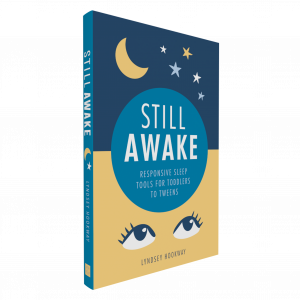22 Feb Book Review
Still Awake: Responsive Sleep Tools for Toddlers to Tweens by Lyndsey Hookway
Reviewed by Moira McLoughlin January 2023

Toddlers and young children are small human beings who, like most adults, will not feed and sleep to a strict schedule. Children have emotional as well as physical needs that do not end at bedtime. That is the premise of Lyndsey Hookway’s Still Awake: Responsive Sleep Tools for Toddlers to Tweens.
Unfortunately, this is a rare concept in books on children’s sleep. Most are filled with shaded images of
clocks denoting the expected number of hours sleep and thereby heap judgement and guilt on the
parents of children who don’t neatly fit the single template for their age. The non-judgmental approach
is Still Awake is very welcome and badly needed.
Research has shown that parenting books that promote strict routines lead to parents feeling more
anxious (53%), misled (47%) and frustrated (36%) (Brown and Harries 2017). Only 12% felt less tired and
22% felt calmer. Yet that is the type of book that dominates the parenting space. Anything written by
Lyndsey Hookway is different and should be in every house with kids.
Still Awake gives a good understanding of normal sleep and questions how and why that differs from
societal expectations. This is a great place for parents with worries about their child’s sleep to begin.
Sleep can be affected by any number of things both physical and emotional. Moving away from strict
routines and embracing responsiveness is going to be kinder on you and your child. This book explains
the biology of sleep, then explores all the different things that can impact sleep, like allergies, illness,
temperament, disability, complex additional needs and more. Not every section will be relevant to every
reader but including such a diverse range of topics makes it relevant and useful to more families than
traditional sleep books.
The book also includes input from experts in a number of different fields (paediatric occupational
therapy, perinatal mental health, sensory processing, speech and language therapy to name just some),
which adds even more to our understanding of what may be going on in any particular situation and
how we as parents and primary carers can help.
Looking at your child as a whole person with experiences, needs and worries that can impact sleep
means this book is about much more than sleep. The information on attachment and responsiveness is
relevant to all aspects of parenting. But most people will pick this book up in the hope that it holds some
nugget of information that will help improve sleep in their house. In my opinion it certainly delivers on
that front, too.
Hookway firmly believes that being responsive to your child’s needs does not mean your family has to
continue to struggle with a sleep situation that is unsustainable. Still Awake includes many practical
tools and tips that allow parents and caregivers to troubleshoot the problems they face in a responsive
way. Some of the tips do not directly work on sleep at all but suggest adjustments during the day that
may have a positive impact on bedtime and nighttime. Others focus on the bedtime routine or on night-
time wakings.
The bottom line is that no single strategy will work for every child and their family. Every situation is
individual and each family needs strategies that are feasible and reasonable for them. Still Awake is not
a one-size fits all approach that we see so often from sleep trainers.
Hookway does not promise that her tools will have every child falling asleep independently and sleeping
through the night every night. Nobody can guarantee that, even though lots of people suggest they can.
Parenting is exhausting. Sleep deprivation makes parenting even more exhausting. Nobody is denying
that. But the options open to parents are not simply put up with the current situation or ignore your
child at night until they sleep better. There are responsive approaches that ensure you meet your child’s
needs while also improving sleep for everyone.
For the purposes of this review, I had both the printed book and the audio version. As a parent it can be
very difficult to fit in time to read a book. Free time is hard to come by and reading is not everyone’s
preferred way to spend that precious time. Audiobooks are a great way to access books we would not
otherwise have the opportunity to read. However, this is the type of book you are likely to go back to
again and again. Different sections will be useful at different times. For that reason, I think most people
will benefit from having the physical book in the house.
Still Awake: Responsive Sleep Tools for Toddlers and Tweens is aimed at parents of children aged
between 18 months and 12 years. If you are in need of information and sleep support for infants and
babies, Hookway’s Holistic Sleep Coaching may be a better place to start.

No Comments